302 scholarly books by University College London and 11
have author last names that start with K
302 scholarly books by University College London and 11
302 scholarly books by University College London
11 have author last names that start with K have author last names that start with K
11 have author last names that start with K have author last names that start with K
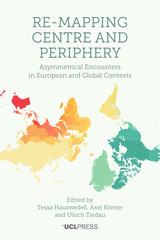
Reflexive Translation Studies
Translation as Critical Reflection
Silvia Kadiu
University College London, 2019
Over the past few decades, translation studies have increasingly focused on the ethical dimension of translational activity with an emphasis on reflexivity to assert the role of the researcher in highlighting issues of visibility, creativity, and ethics. In Reflexive Translation Studies, Silvia Kadiu investigates the viability of theories that seek to empower translation by making visible its transformative dimension, such as championing the visibility of the translating subject or the translator’s right to creativity. Inspired by Derrida’s deconstructive thinking, Kadiu presents practical ways of challenging theories that argue reflexivity is the only way of developing an ethical translation. She questions the capacity of reflexivity to counteract the power relations at play in translation and problematizes affirmative claims about self-knowledge by using translation itself as a process of critical reflection.
In exploring the interaction between form and content, Reflexive Translation Studies promotes the need for an experimental, multisensory, and intuitive practice, which invites students, scholars, and practitioners alike to engage with theory productively and creatively through translation.
In exploring the interaction between form and content, Reflexive Translation Studies promotes the need for an experimental, multisensory, and intuitive practice, which invites students, scholars, and practitioners alike to engage with theory productively and creatively through translation.
[more]
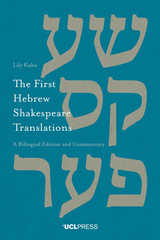
First Hebrew Shakespeare Translations
A Bilingual Edition and Commentary
Lily Kahn
University College London, 2017
This pioneering book is the first bilingual analysis of Isaac Edward Salkinson’s nineteenth-century translations into Hebrew of Shakespeare’s Othello and Romeo and Juliet. Lily Kahn shows how Salkinson’s translations are replete with biblical, rabbinic, and medieval Hebrew textual references. The volume includes the full Hebrew texts of both plays alongside a complete English back-translation and paired with Kahn’s commentary examining the array of Hebrew sources and allusions that Salkinson incorporates. The edition also contains an introduction to Jewish reception of Shakespeare in Central and Eastern Europe and a survey of Salkinson’s biography and his translation strategies.
[more]
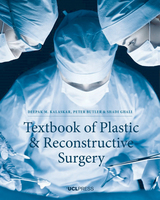
Textbook of Plastic and Reconstructive Surgery
Deepak K. Kalaskar
University College London, 2016
Written by experts from London’s renowned Royal Free Hospital, Textbook of Plastic and Reconstructive Surgery offers a comprehensive overview of the vast topic of reconstructive plastic surgery and its various subspecialties for introductory plastic surgery and surgical science courses. The book comprises five sections covering the fundamental principles of plastic surgery, cancer, burns and trauma, paediatric plastic surgery and aesthetic surgery, and covers the breadth of knowledge that students need to further their career in this exciting field. Additional coverage of areas in which reconstructive surgery techniques are called upon includes abdominal wall reconstruction, ear reconstruction and genital reconstruction. A chapter on aesthetic surgery includes facial aesthetic surgery and blepharoplasty, aesthetic breast surgery, body contouring and the evolution of hair transplantation. The broad scope of this volume and attention to often neglected specialisms such as military plastic surgery make this a unique contribution to the field. Heavily illustrated throughout, Textbook of Plastic and Reconstructive Surgery is essential reading for anyone interested in furthering their knowledge of this exciting field. This book was produced as part of JISC's Institution as e-Textbook Publisher project. Find out more at https://www.jisc.ac.uk/rd/projects/institution-as-e-textbook-publisher
[more]
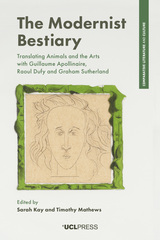
The Modernist Bestiary
Translating Animals and the Arts with Guillaume Apollinaire, Raoul Dufy and Graham Sutherland
Sarah Kay
University College London, 2020
The Modernist Bestiary centres on Le Bestiaire ou Cortège d’Orphée (1911), a multimedia collaborative work by French-Polish poet Guillaume Apollinaire and French artist Raoul Dufy, and its homonym, The Bestiary or Procession of Orpheus (1979), by British artist Graham Sutherland. Rather than reconstructing the lineage of these two compositions, the book uncovers the aesthetic and intellectual processes involved that operate in different times, places and media. The Apollinaire and Dufy Bestiary is an open-ended collaboration, a feature that Sutherland develops in his re-visiting, and this book shows how these neglected works are caught up in many-faceted networks of traditions and genres. The contributors’ encounters with these works take the form of poetry and essays, all moving freely between different disciplines and practices, humanistic and posthumanist critical dimensions, as well as different animals and art forms. They draw on disciplines ranging from music, art history, translation, Classical poetry, and French poetry, and are nurtured by approaches including phenomenology, cultural studies, sound studies, and critical animal studies. Collectively the book shows that the aesthetic encounter, by nature effective, is by nature also interdisciplinary and motivating and that it spurs the critical in addressing the complex issues of 'human animality'.
[more]
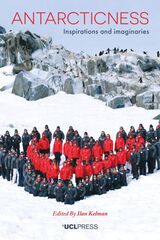
Antarcticness
Inspirations and Imaginaries
Ilan Kelman
University College London, 2022
Original research, art, and interpretations of different experiences and explorations of Antarctica.
Antarcticness brings together disciplines, communication approaches, and ideas to explore meanings and depictions of Antarctica. Personal and professional words in poetry and prose, plus images, present and represent Antarctica, as presumed and as imagined, alongside what is experienced around the continent and by those watching from afar. These understandings explain how the Antarctic is viewed and managed while identifying aspects that should be more prominent in policy and practice.
The authors and artists featured in the book place Antarctica, and the perceptions and knowledge through Antarcticness, within inspirations and imaginations, without losing sight of the multiple interests pushing the continent’s governance as it goes through rapid political and environmental changes. Because of the diversity and disparity of the influences and changes the continent faces, the book’s contributions are carefully connected to provide a more coherent and encompassing perspective of how society views Antarctica, scientifically and artistically, and what the continent provides and could provide politically, culturally, and environmentally.
Antarcticness brings together disciplines, communication approaches, and ideas to explore meanings and depictions of Antarctica. Personal and professional words in poetry and prose, plus images, present and represent Antarctica, as presumed and as imagined, alongside what is experienced around the continent and by those watching from afar. These understandings explain how the Antarctic is viewed and managed while identifying aspects that should be more prominent in policy and practice.
The authors and artists featured in the book place Antarctica, and the perceptions and knowledge through Antarcticness, within inspirations and imaginations, without losing sight of the multiple interests pushing the continent’s governance as it goes through rapid political and environmental changes. Because of the diversity and disparity of the influences and changes the continent faces, the book’s contributions are carefully connected to provide a more coherent and encompassing perspective of how society views Antarctica, scientifically and artistically, and what the continent provides and could provide politically, culturally, and environmentally.
[more]
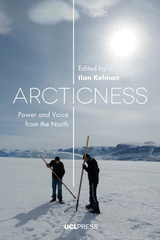
Arcticness
Power and Voice from the North
Ilan Kelman
University College London, 2017
Climate change and globalization are opening up the Arctic for resource development and exploitation. But what about the views, interests, and needs of the peoples who already live in the region? Featuring essays by both academics and Arctic peoples themselves, this new book covers the social, legal, political, geographical, scientific, environmental, and creative questions related to Arcticness and addresses the exceptional challenges faced by the Arctic region and its local communities.
[more]
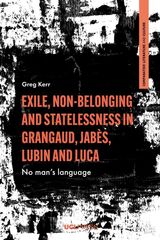
Exile, Non-Belonging and Statelessness in Grangaud, Jabès, Lubin and Luca
No Man's Language
Greg Kerr
University College London, 2021
A close study of four French-language poets and the poetry of exile.
Poetry has often been understood as a powerful vector of collective belonging. The idea that certain poets are emblematic of a national culture is one of the chief means by which literature historicizes itself, inscribes itself in a shared cultural past, and supplies modes of belonging to those who consume it. But, how does the exiled, migrant, or translingual poet complicate this narrative? For Armen Lubin, Ghérasim Luca, Edmond Jabès, and Michelle Grangaud, the practice of poetry is inseparable from a sense of restlessness or unease. Ranging across borders within and beyond the Francosphere—from Algeria, Armenia, Egypt, and Romania—this book shows how a poetic practice inflected by exile, statelessness, or non-belonging has the potential to disrupt long-held assumptions about the relation between subjects, the language they use, and the place from which they speak.
Poetry has often been understood as a powerful vector of collective belonging. The idea that certain poets are emblematic of a national culture is one of the chief means by which literature historicizes itself, inscribes itself in a shared cultural past, and supplies modes of belonging to those who consume it. But, how does the exiled, migrant, or translingual poet complicate this narrative? For Armen Lubin, Ghérasim Luca, Edmond Jabès, and Michelle Grangaud, the practice of poetry is inseparable from a sense of restlessness or unease. Ranging across borders within and beyond the Francosphere—from Algeria, Armenia, Egypt, and Romania—this book shows how a poetic practice inflected by exile, statelessness, or non-belonging has the potential to disrupt long-held assumptions about the relation between subjects, the language they use, and the place from which they speak.
[more]
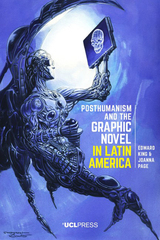
Posthumanism and the Graphic Novel in Latin America
Edward King
University College London, 2017
Latin America is experiencing a boom in graphic novels that are innovative in their conceptual play and their reworking of the medium. Drawing on a range of sophisticated work, these graphic novels experiment with questions of the representation of urban space, modes of perception and cognition, and new forms of ethics in the post-human world. As the first book-length study of the topic, this book argues that the graphic novel’s emergence in Latin America acts as a uniquely powerful force exploring the nature of twenty-first-century subjectivity, emphasizing the ways that humans are bound to their non-human environment.
[more]

Violent Affections
Queer Sexuality, Techniques of Power, and Law in Russia
Alexander Sasha Kondakov
University College London, 2022
An inciteful analysis of the affective rhetoric surrounding Russian anti-LGBTQ violence.
Passed in 2013, Russia’s “gay propaganda” law cemented the nation’s anti-LGBTQ sentiment into legal rhetoric that has since emboldened countless instances of violence against queer people. Based on an analysis of over three hundred criminal cases of anti-queer violence in Russia before and after the introduction of the law, Violent Affections shows how violent acts are framed in emotional language by perpetrators during their criminal trials, thus uncovering the techniques of power that work to translate emotions into violence against queer people. Utilizing an original methodology of studying legal memes, this book argues that individual affective states are directly connected to the political and legislative violence aimed at policing queer lives. Alexander Sasha Kondakov expands upon two sets of interdisciplinary literature–queer theory and affect theory–in order to conceptualize what is referred to as neo-disciplinary power. The book traces how affections circulate from body to body as a kind of virus, eventually enabling the turn from a memetic response to violent action.
Passed in 2013, Russia’s “gay propaganda” law cemented the nation’s anti-LGBTQ sentiment into legal rhetoric that has since emboldened countless instances of violence against queer people. Based on an analysis of over three hundred criminal cases of anti-queer violence in Russia before and after the introduction of the law, Violent Affections shows how violent acts are framed in emotional language by perpetrators during their criminal trials, thus uncovering the techniques of power that work to translate emotions into violence against queer people. Utilizing an original methodology of studying legal memes, this book argues that individual affective states are directly connected to the political and legislative violence aimed at policing queer lives. Alexander Sasha Kondakov expands upon two sets of interdisciplinary literature–queer theory and affect theory–in order to conceptualize what is referred to as neo-disciplinary power. The book traces how affections circulate from body to body as a kind of virus, eventually enabling the turn from a memetic response to violent action.
[more]
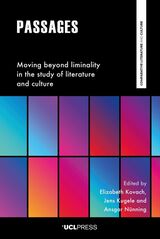
Passages
Moving beyond Liminality in the Study of Literature and Culture
Elizabeth Kovach
University College London, 2022
An interdisciplinary exploration of the concept of passages.
The study of literature and culture is marked by various distinct understandings of passages—as both phenomena and critical concepts. These include the anthropological notion of rites of passage, the shopping arcades (Passagen) theorized by Walter Benjamin, the Middle Passage of the Atlantic slave trade, present-day forms of migration and resettlement, and understandings of translation and adaptation. This book explores passages as contexts and processes within which liminal experiences and encounters are situated. Based on the premise that concepts travel through times, contexts, and discursive settings, the volume enables a meaningful exchange regarding passages across disciplinary, national, and linguistic boundaries. Contributions from senior scholars and early-career researchers whose work focuses on areas such as cultural memory, performativity, space, media, (cultural) translation, ecocriticism, gender, and race utilize specific understandings of passages and liminality, reflecting on their value and limits for their research.
The study of literature and culture is marked by various distinct understandings of passages—as both phenomena and critical concepts. These include the anthropological notion of rites of passage, the shopping arcades (Passagen) theorized by Walter Benjamin, the Middle Passage of the Atlantic slave trade, present-day forms of migration and resettlement, and understandings of translation and adaptation. This book explores passages as contexts and processes within which liminal experiences and encounters are situated. Based on the premise that concepts travel through times, contexts, and discursive settings, the volume enables a meaningful exchange regarding passages across disciplinary, national, and linguistic boundaries. Contributions from senior scholars and early-career researchers whose work focuses on areas such as cultural memory, performativity, space, media, (cultural) translation, ecocriticism, gender, and race utilize specific understandings of passages and liminality, reflecting on their value and limits for their research.
[more]
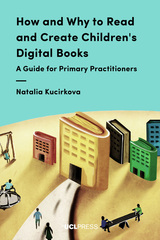
How and Why to Read and Create Children's Digital Books
A Guide for Primary Practitioners
Natalia Kucirkova
University College London, 2018
How and Why to Read and Create Children’s Digital Books outlines effective ways of using digital books in early years and primary classrooms, and specifies the educational potential of using digital books and apps in physical spaces and virtual communities. With a particular focus on apps and personalized reading, Natalia Kucirkova combines theory and practice to argue that personalized reading is only truly personalized when it is created or cocreated by reading communities. Part I suggests criteria to evaluate the educational quality of digital books and practical strategies for their use in the classroom. Specific attention is paid to the ways in which digital books can support individual children’s strengths and difficulties, digital literacies, and language and communication skills . Part II explores digital books created by children, caregivers, teachers, and librarians and offers insights into how smart toys can likewise enrich children’s reading for pleasure.
[more]
READERS
Browse our collection.
PUBLISHERS
See BiblioVault's publisher services.
STUDENT SERVICES
Files for college accessibility offices.
UChicago Accessibility Resources
home | accessibility | search | about | contact us
BiblioVault ® 2001 - 2024
The University of Chicago Press









